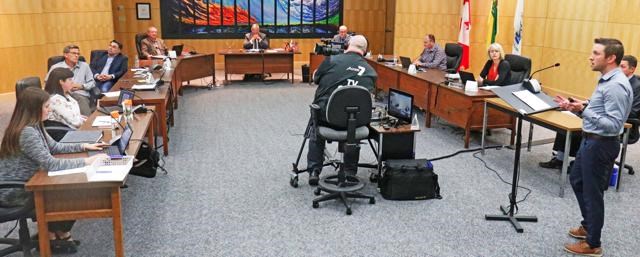Weyburn’s city council approved a small shift in the mill rates at their meeting on Monday evening, lowering the tax rate on commercial properties and raising it slightly on residential properties, along with an increase in agricultural and railway mill rates.
Prior to setting the mill rates, which determine the rate of taxation for 2021, council had asked the Economic Ad Hoc committee to look at reducing the ratio between commercial and residential properties. Weyburn’s ratio was 1.92, which means commercial properties paid 1.92 times as much residential property owners at the set tax rate.
The recommendation was to raise the mill rates for agricultural and railway properties, and on residential properties, and to lower the commercial mill rate.
The result will be, for a commercial property with an assessment of $300,000, a decrease of $13.70, and for a residential property with an assessment of $300,000, there will be an increase of about 97 cents.
Coun. Jeff Richards said he would vote in favour of this move as 2020 was a very difficult year for the business community, and 2021 might be even harder.
“A $13.70 decrease isn’t going to make much difference, and it might not, but what’s important is it’s not an increase. The message to the business community is, ‘don’t worry about your taxes going up this year, we’re going to hold fast on that’,” said Coun. Richards, adding the message to the province’s business community is that Weyburn is open for business, and in spite of tough times, they are lowering taxes for businesses.
He acknowledged the commercial to residential ratio isn’t as good as it is for Regina, but added, “We can’t do this quickly. We have to do it slow and we have to do it intelligently.”
Coun. Ryan Janke agreed with the direction council is taking on this issue, and said, “I would rather see a tiny increase on residential taxes rather than be the proverbial straw that breaks the camel’s back and cause someone to lose their job and not be able to pay their rent or make a payment.”
The sole dissenter on this vote was Coun. Dick Michel, who argued that residential taxpayers have paid their share by handling the hospital levy alone, as it was not put onto the commercial sector. This year, the levy came off the tax bill, after being at $40 last year and $140 a year prior to that.
Coun. Mel Van Betuw supported the shift, and commented, “I do believe the business is suffering. This is a small gesture, but it’s a gesture to say, ‘we do support you’. If we didn’t do anything, the increase would’ve been in the scope of $50-60 rather than a decrease. I just hope residents understand the need to support our businesses in town.”
Mayor Marcel Roy said he had to disagree with Coun. Michel, pointing out that the city needs to have things in the right perspective as they try to keep taxes as low as they possibly can.
Coun. John Corrigan was also in support of the shift in mill rates, and said the ad hoc committee had struck “an excellent balance” that would help the businesses.
“I agree with the comments that without our business community, we won’t have residents to pay taxes anyway. We need this balance,” he said. “It looks very fair to me.”
Coun. Laura Morrissette commended finance director Laura Missal for her many hours of work on this issue, and said, “Thank you for keeping the business community in front of mind and seeing how important they really are.”
Coun. Richards pointed out that compared to other jurisdictions, Weyburn is still “exceptionally affordable” as a place to live, and this is why the city has to strike a balance.
The shift will allow the city “to make a tiny tiny bit easier for our business community,” he added, before the vote was taken. The mill rates were approved by a vote of 6-1, with Coun. Michel voting against.



